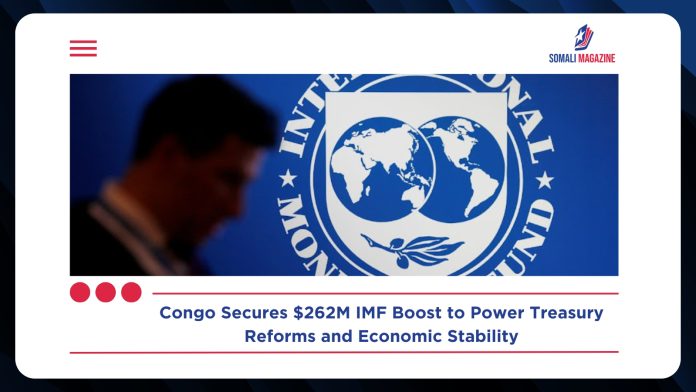Facebook Twitter (X) Instagram Somali Magazine - People's Magazine
Congo gets $262m from IMF on treasury reforms, marking a significant milestone in the country’s efforts to overhaul its public financial management and stabilize its economy. The disbursement, approved under the International Monetary Fund’s Extended Credit Facility (ECF), is the second tranche of a $1.7 billion programme aimed at supporting the Democratic Republic of Congo’s (DRC) balance of payments and strengthening its foreign exchange reserves.
The $261.9 million release follows the IMF Executive Board’s completion of the first review of Congo’s performance under the 38-month programme. The board noted that despite some missed structural benchmarks, the DRC met all quantitative performance criteria, particularly in implementing a Treasury Single Account (TSA)—a key reform designed to consolidate thousands of fragmented government accounts into a unified system.
The TSA reform is central to improving fiscal discipline, enhancing transparency, and curbing corruption. A spot check by the IMF in July 2024 revealed that the Congolese government operated over 3,600 accounts, including 607 linked to ministries and 2,608 supplementary budget accounts. The reform aims to phase out these parallel systems and centralize public funds under the Central Bank of Congo (BCC), supported by software upgrades and stress tests to assess the impact on local banks.
The IMF praised the DRC’s “concomitant progress” in implementing the TSA and noted that the reform would also support domestic revenue mobilization by eliminating unofficial tax collection channels. Although the government began working on the TSA in May 2023, tangible progress only accelerated after the ECF programme was launched earlier this year.

Despite the positive review, the IMF acknowledged that Congo’s performance under the programme was mixed due to the intensification of conflict in the eastern regions, which placed significant strain on the national budget. The government overshot its fiscal deficit target, reaching 0.8% of GDP instead of the agreed 0.3%, largely due to increased security spending. Additionally, the BCC’s foreign exchange reserves fell short of targets due to higher-than-expected tax payments in foreign currency.
Nevertheless, the IMF granted waivers for these missed targets, citing the government’s commitment to macroeconomic stability and structural reform. The recent peace agreement signed between Congo and Rwanda in Washington was also highlighted as a positive development that could improve the country’s fiscal outlook and help meet future targets.
IMF Deputy Managing Director Kenji Okamura emphasized that the DRC authorities have pledged to accelerate reforms in key areas, including anti-money laundering, business climate improvement, governance, and national statistics. These efforts are expected to create a more transparent and accountable fiscal environment, which is essential for long-term economic growth and investor confidence.
The IMF’s support is not just financial—it also serves as a vote of confidence in Congo’s reform agenda. The successful implementation of the TSA and other fiscal measures could pave the way for additional international support and private sector investment.
Congo’s experience mirrors similar reforms in other African countries such as Kenya, Uganda, and Tanzania, where the IMF has pushed for the adoption of Treasury Single Accounts to improve fiscal control and reduce leakages. As the DRC continues its journey toward fiscal consolidation and economic resilience, the latest IMF disbursement offers both a financial lifeline and a powerful incentive to stay the course.

